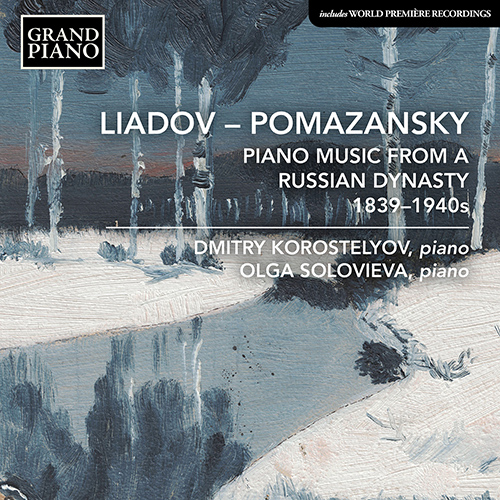
About this Release
“The music presented in this album is one of the rarities that represent not only historical, but also art value. The authors of these wonderful pièces de salon offer original solutions within the generally accepted genres of the time. These compositions, imbued with the nature of dance, reveal themselves in many and inventive ways.” — Dmitry Korostelyov
PIANO MUSIC FROM A RUSSIAN DYNASTY
K.N. Liadov • A.N. Liadov • A.K. Liadov • Pomazansky
- Dmitry Korostelyov, piano
- Olga Solovieva, piano
The uniquely influential Russian musical and theatrical dynasty of the Liadov, Antipov and Pomazansky families supplied Russian culture with nearly 20 musical and theatrical performers, conductors, composers, and ballet dancers over the course of 150 years. Including numerous world première recordings, these wonderful pièces de salon are gems of Russian dance music, full of charming grace, melodic delicacy and nobility. A quote from Anatoly Liadov can stand as representative for all: ‘such is my character: do everything so that every bar gratifies.’
This recording was made on a modern instrument: Steinway, Model D
Tracklist
|
Liadov, Konstantin Nikolayevich
|
|
1
Tarantelle (c1844) (00:03:18)
|
|
2
Polka Militaire (1852) (00:01:40)
|
|
3
Polka-Mazurka, "La Silphide" (c. 1850) (00:03:34)
|
|
4
Marche Funèbre (1852) (00:05:47)
|
|
5
Garibaldi-Quadrille (c1869) (00:05:42)
|
|
6
Polka Russe (c1852) (00:02:38)
|
|
7
Quadrille, "Mariage Russe" (1852) (00:05:57)
|
|
Pomazansky, Eugeny Ivanovich
|
|
8
Berceuse (c. 1940) (00:00:47)
|
|
9
Cuckoo (1940) (00:00:27)
|
|
10
Chanson d'automne (c. 1940) (00:00:31)
|
|
Antipov, Konstantin Afanasievich
|
|
2 Preludes, Op. 8 () (00:05:00 )
|
|
11
No. 1. Allegretto (00:01:41)
|
|
12
No. 2. Andantino (00:03:01)
|
|
13
Variations on a Theme, "Chizhyk-pyzhyk" (1892) (00:01:05)
|
|
14
Nocturne in A-Flat Major, Op. 12 () (00:03:16)
|
|
Liadov, Alexander Nikolayevich
|
|
Housewarming (?1839) (00:11:00 )
|
|
15
I. Polonaise (00:03:08)
|
|
16
II. French Quadrille (00:04:25)
|
|
17
III. Mazurka (00:01:16)
|
|
18
IV. Galoppe (00:01:55)
|
|
Pomazansky, Ivan Aleksandrovich
|
|
19
Polka (c. 1880) (00:02:54)
|
|
Liadov, Anatol Konstantinovich
|
|
20
2 P'yesï (2 Pieces), Op. 24: No. 1. Prelude in E Major (1890) (00:03:25)
|
|
21
Novinka (Novelette), Op. 20 (1889) (00:02:57)
|
|
22
Prelude in B Major, Op. 42, No. 2 (1898) (00:00:43)
|
|
23
Na luzhayke: Nabrosok (In the Glade: Sketch), Op. 23 (1890) (00:02:58)
|
|
24
Zoryushka (sketch fragment) (1889) (00:00:36)
|
|
25
Pro starinu (About Olden Times), Op. 21 (1889) (00:05:08)
|
The Artist(s)
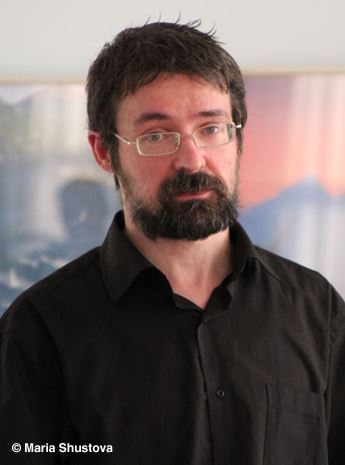 Dmitry Korostelyov was born in 1979 in Volgograd where he received his first piano lessons. At the Moscow Conservatory he studied composition with Alexey Nikolayev, graduating in 2003, then completed a postgraduate course in the class of Valery Kikta. He also studied harpsichord and was assistant to Tatiana Zenaishvili.
Dmitry Korostelyov was born in 1979 in Volgograd where he received his first piano lessons. At the Moscow Conservatory he studied composition with Alexey Nikolayev, graduating in 2003, then completed a postgraduate course in the class of Valery Kikta. He also studied harpsichord and was assistant to Tatiana Zenaishvili. 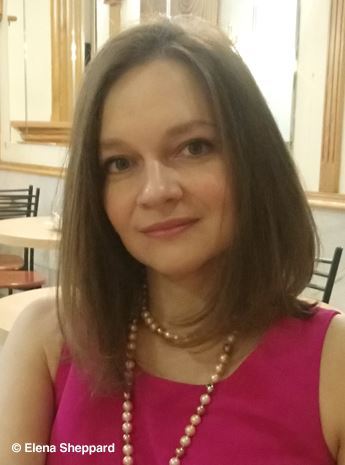 Russian pianist Olga Solovieva is a laureate of several international competitions, and in May 2019 she received the Glinka Medal for her contribution to musical art. She has performed in Russia and internationally and collaborated with musicians and ensembles including the Vanbrugh Quartet, Vilnius String Quartet, Christopher Marwood, Roel Dieltiens, Haik Kazazyan, Fanny Clamagirand, Julian Bliss and Sergey Kostylev, among others.
A graduate of the Russian Academy of Music, she has recorded two albums for Grand Piano, including Stanchinsky’s Complete Piano Works, Vol. 1 (GP766) and Boris Tchaikovsky's Piano and Chamber Works (GP716) together with compatriot Dmitry Korosteyov. Olga has been a professor at the Gnessin State Musical College since 2004.
Russian pianist Olga Solovieva is a laureate of several international competitions, and in May 2019 she received the Glinka Medal for her contribution to musical art. She has performed in Russia and internationally and collaborated with musicians and ensembles including the Vanbrugh Quartet, Vilnius String Quartet, Christopher Marwood, Roel Dieltiens, Haik Kazazyan, Fanny Clamagirand, Julian Bliss and Sergey Kostylev, among others.
A graduate of the Russian Academy of Music, she has recorded two albums for Grand Piano, including Stanchinsky’s Complete Piano Works, Vol. 1 (GP766) and Boris Tchaikovsky's Piano and Chamber Works (GP716) together with compatriot Dmitry Korosteyov. Olga has been a professor at the Gnessin State Musical College since 2004. The Composer(s)
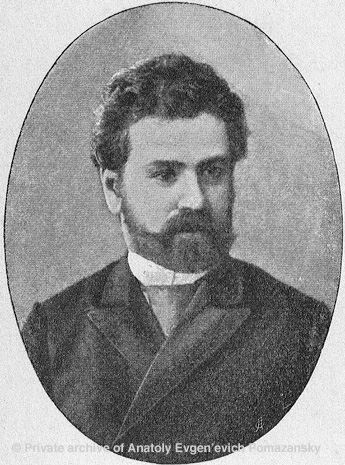 Konstantin Afanasievich Antipov studied at the Saint Petersburg Commercial College, and later at Saint Petersburg Conservatoire, graduating in 1886. He studied composition under Rimsky-Korsakov who pointed out his unmistakable talent. The Mitrofan Belaieff publishing house printed 13 opuses by Antipov (all for piano, except for Allegro Symphonique for orchestra, and one opus with songs). In the late 1890s Antipov withdrew from composing.
Konstantin Afanasievich Antipov studied at the Saint Petersburg Commercial College, and later at Saint Petersburg Conservatoire, graduating in 1886. He studied composition under Rimsky-Korsakov who pointed out his unmistakable talent. The Mitrofan Belaieff publishing house printed 13 opuses by Antipov (all for piano, except for Allegro Symphonique for orchestra, and one opus with songs). In the late 1890s Antipov withdrew from composing. 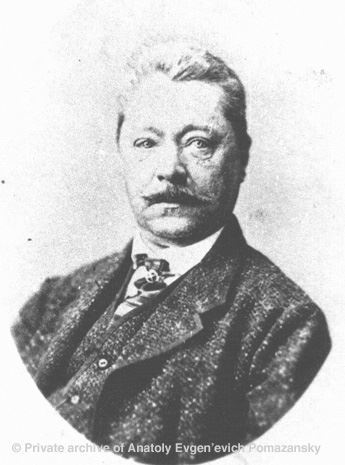 One of Konstantin’s older brothers Alexander Nikolayevich Liadov, having started his musical career as a violinist, became a ballet and ballroom conductor. The 1840s were the peak of his fame, and he was called ‘a magician of illustrious balls’. The first piano pieces written by Alexander were published at the time when his brother Konstantin began composing (Alexander was over 30 years old). Alexander, as contemporaries recall, was not able to orchestrate the music. Once he received an order from Emperor Nicholas I who whistled a waltz tune to him and requested that this waltz be performed with the orchestra that same evening. Alexander wrote down the tune and rushed off to Konstantin to ‘beg him to help resolve this difficult task’. In two and a half hours his brother’s orchestration was ready, and the orchestra performance of the waltz that evening was conducted by Alexander – for which he received a ‘valuable gift from the Tsar’. All known details of the life and career of the both brothers allow us to conclude that many musical pieces printed under the name of Alexander Liadov, probably involved his brother Konstantin’s participation. Besides, Konstantin did not have the right to publish sheet music under his own name: composing such music was part of his instructional and later, professional work at the Imperial Theatres, and as such the music was the property of the Imperial Theatres.
One of Konstantin’s older brothers Alexander Nikolayevich Liadov, having started his musical career as a violinist, became a ballet and ballroom conductor. The 1840s were the peak of his fame, and he was called ‘a magician of illustrious balls’. The first piano pieces written by Alexander were published at the time when his brother Konstantin began composing (Alexander was over 30 years old). Alexander, as contemporaries recall, was not able to orchestrate the music. Once he received an order from Emperor Nicholas I who whistled a waltz tune to him and requested that this waltz be performed with the orchestra that same evening. Alexander wrote down the tune and rushed off to Konstantin to ‘beg him to help resolve this difficult task’. In two and a half hours his brother’s orchestration was ready, and the orchestra performance of the waltz that evening was conducted by Alexander – for which he received a ‘valuable gift from the Tsar’. All known details of the life and career of the both brothers allow us to conclude that many musical pieces printed under the name of Alexander Liadov, probably involved his brother Konstantin’s participation. Besides, Konstantin did not have the right to publish sheet music under his own name: composing such music was part of his instructional and later, professional work at the Imperial Theatres, and as such the music was the property of the Imperial Theatres. 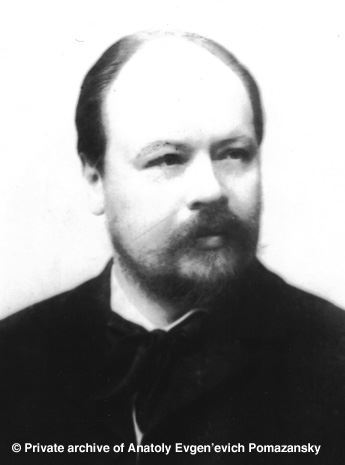 The son of a conductor at the Mariinsky Theatre in St Petersburg, Anatol Liadov was trained at the Conservatory, where he was briefly a pupil of Rimsky-Korsakov and later a member of the teaching staff. He was associated with Balakirev and subsequently became a member of Belyayev’s circle, helping, in particular, in the establishment of the publishing house that Belyayev set up for Russian composers. He was a thoroughly competent musician, conductor and composer but did not apply himself consistently to work. His failure to supply music for a Diaghilev ballet in Paris in 1910 allowed Stravinsky his first chance with the Ballets Russes. His compositions are characteristic of this period in Russian music, when nationalism was joined with technical competence inculcated at the conservatories.
The son of a conductor at the Mariinsky Theatre in St Petersburg, Anatol Liadov was trained at the Conservatory, where he was briefly a pupil of Rimsky-Korsakov and later a member of the teaching staff. He was associated with Balakirev and subsequently became a member of Belyayev’s circle, helping, in particular, in the establishment of the publishing house that Belyayev set up for Russian composers. He was a thoroughly competent musician, conductor and composer but did not apply himself consistently to work. His failure to supply music for a Diaghilev ballet in Paris in 1910 allowed Stravinsky his first chance with the Ballets Russes. His compositions are characteristic of this period in Russian music, when nationalism was joined with technical competence inculcated at the conservatories. 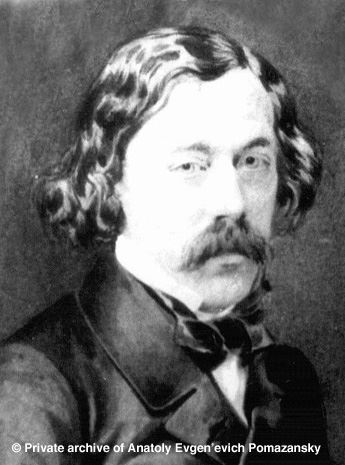 Konstantin Nikolayevich Liadov was the father of the famous Russian composer Anatoly Konstantinovich Liadov. In the mid-19th century he was a prominent figure in the musical scene, being the chief conductor of the Imperial Russian Opera, and the first conductor of the Mariinsky Theatre since the date of its ceremonial opening on 2 October 1860. He was the conductor for the first performances of numerous works by Russian composers, as well as for Russian premieres of foreign works. Konstantin Liadov was also a composer, whose works enjoyed high popularity at the time.
Konstantin Nikolayevich Liadov was the father of the famous Russian composer Anatoly Konstantinovich Liadov. In the mid-19th century he was a prominent figure in the musical scene, being the chief conductor of the Imperial Russian Opera, and the first conductor of the Mariinsky Theatre since the date of its ceremonial opening on 2 October 1860. He was the conductor for the first performances of numerous works by Russian composers, as well as for Russian premieres of foreign works. Konstantin Liadov was also a composer, whose works enjoyed high popularity at the time. 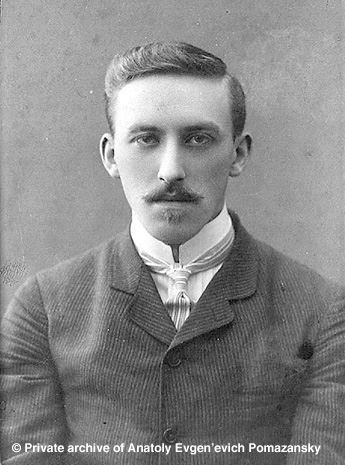 Eugeny Ivanovich Pomazansky, the son of Ivan Pomazansky and Valentina Liadova, the only and beloved nephew of Anatoly Liadov, studied piano at the Saint Peteresburg Conservatoire; his teacher in composition was Rimsky-Korsakov. Eugeny also studied under Anatoly Liadov and Balakirev. He taught in Saratov, Saint Petersburg/Petrograd/Leningrad and Tomsk, performed as a pianist and gave lectures. In 1940 he founded and took the helm of a music school in Pskov, and was also involved in rebuilding it after the Second World War. He wrote music throughout his life, but almost all of his manuscripts are lost.
Eugeny Ivanovich Pomazansky, the son of Ivan Pomazansky and Valentina Liadova, the only and beloved nephew of Anatoly Liadov, studied piano at the Saint Peteresburg Conservatoire; his teacher in composition was Rimsky-Korsakov. Eugeny also studied under Anatoly Liadov and Balakirev. He taught in Saratov, Saint Petersburg/Petrograd/Leningrad and Tomsk, performed as a pianist and gave lectures. In 1940 he founded and took the helm of a music school in Pskov, and was also involved in rebuilding it after the Second World War. He wrote music throughout his life, but almost all of his manuscripts are lost. 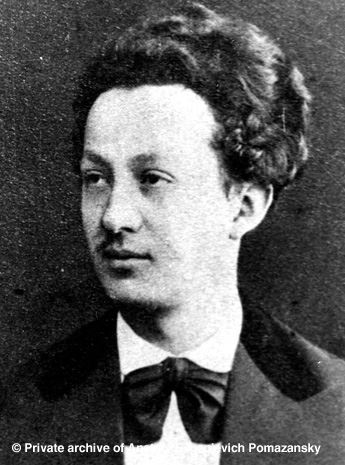 Ivan Aleksandrovich Pomazansky held degrees from the Saint Petersburg Conservatoire in harp performance and composition. For 50 years, he played harp and was the choir master at the Mariinsky Theatre. Pomazansky played a significant role in Russian opera productions: he instructed choirs readying them for premieres of Rimsky-Korsakov’s operas and for Mussorgsky’s Boris Godunov. He performed as pianist and conductor, promoting the music of Russian composers. Following Tchaikovsky’s request, Pomazansky arranged the opera The Oprichnik for piano, and Tchaikovsky wrote, it is said, a large harp part in the opera, personally for Pomazansky. Of Pomazansky’s music only a few songs have survived and a single piano piece, the Polka is dedicated to Anatoly Liadov.
Ivan Aleksandrovich Pomazansky held degrees from the Saint Petersburg Conservatoire in harp performance and composition. For 50 years, he played harp and was the choir master at the Mariinsky Theatre. Pomazansky played a significant role in Russian opera productions: he instructed choirs readying them for premieres of Rimsky-Korsakov’s operas and for Mussorgsky’s Boris Godunov. He performed as pianist and conductor, promoting the music of Russian composers. Following Tchaikovsky’s request, Pomazansky arranged the opera The Oprichnik for piano, and Tchaikovsky wrote, it is said, a large harp part in the opera, personally for Pomazansky. Of Pomazansky’s music only a few songs have survived and a single piano piece, the Polka is dedicated to Anatoly Liadov. Reviews
“In sound that is vivid, colorful, and spacious, with realistic, well-defined piano tone, this release reopens a forgotten chapter in Russian musical history and offers some enjoyable music in fine performances.” – Fanfare

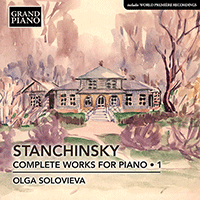
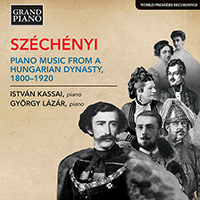
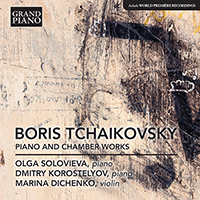
 Grand Piano has gained a reputation for producing high quality recordings of rare keyboard gems. Dedicated to the exploration of undiscovered piano repertoire, the label specialises in complete cycles of piano works by many lesser-known composers, whose output might otherwise have remained unknown and unrecorded.
Grand Piano has gained a reputation for producing high quality recordings of rare keyboard gems. Dedicated to the exploration of undiscovered piano repertoire, the label specialises in complete cycles of piano works by many lesser-known composers, whose output might otherwise have remained unknown and unrecorded.






